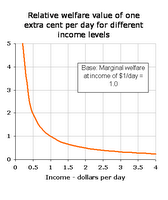Is Millennium Development Goal no.1 rubbish?
 As a call to arms, you can't beat the first target in the first of the Millennium Development Goals ... "Between 1990 and 2015, reduce by half the proportion of people living on less than a dollar a day". There were about 1.2 billion people living on $1 per day or less in 2001 (about 1 in 5 people). The trouble with this goal is that it encourages efforts to focus on the second poorest 600 million people in world, in the hope that they can be dragged over the MDG line because they are nearest to it. [Similar things happen with any target for clearing a threshold: eg. in education, getting 5 good GCSEs... teacher's incentive is not to waste time on some kid that can't read]. As the chart shows most of the MDG progress to date is from rapidly growing China and the Far East... in sub-Saharan Africa, it's actually heading the wrong way.
As a call to arms, you can't beat the first target in the first of the Millennium Development Goals ... "Between 1990 and 2015, reduce by half the proportion of people living on less than a dollar a day". There were about 1.2 billion people living on $1 per day or less in 2001 (about 1 in 5 people). The trouble with this goal is that it encourages efforts to focus on the second poorest 600 million people in world, in the hope that they can be dragged over the MDG line because they are nearest to it. [Similar things happen with any target for clearing a threshold: eg. in education, getting 5 good GCSEs... teacher's incentive is not to waste time on some kid that can't read]. As the chart shows most of the MDG progress to date is from rapidly growing China and the Far East... in sub-Saharan Africa, it's actually heading the wrong way.  There is good theory (backed by common sense) that says a given sum of money is worth more to you, the poorer you are. This means the relation between 'utility' or welfare and consumption is not a straight one-for-one. The UK Treasury has examined this relationship and its bible of economic rectitude, the Green Book (see relevant section), gives the function as:
There is good theory (backed by common sense) that says a given sum of money is worth more to you, the poorer you are. This means the relation between 'utility' or welfare and consumption is not a straight one-for-one. The UK Treasury has examined this relationship and its bible of economic rectitude, the Green Book (see relevant section), gives the function as:
extra welfare = extra consumption x 1/consumption level
Assuming something like this applies to the very poor, this relationship is plotted to the left. This means a one cent per day increase is worth 5 times as much to someone on 20c per day compared to someone on $1 per day. If the aim of a development organisation was to maximise welfare from its programmes (rather than meet MDGs), it would be focussing on making small improvements in the position of the ultra poor, not pushing the upwardly mobile 2nd income decile over the MDG line. And even though it is difficult and expensive to do it, the welfare return would could be more than enough to justify the extra costs and apparent inefficiencies.
Apart from the fact that the MDGs disincentivise it, why doesn't this happen? Probably because the most wretched people live in conflict zones, fragile states, and/or on environmentally marginal or threatened lands. Here the development organisations find it much harder to operate - the 'aid agency' model is comfortable funding photogenic schools and hospitals... but what the ultra poor need is their basic needs met, and usually security and stability above all. But peace-keeping or peace-making expenditures don't count against the UN commitments for rich countries to spend 0.7% GDP on overseas development assistance, so these large sums go elsewhere.
So, to summarise: big totemic development targets discourage the most welfare-maximising interventions for the most desperate people. Great!
(with thanks to Catriona Laing)



No comments:
Post a Comment